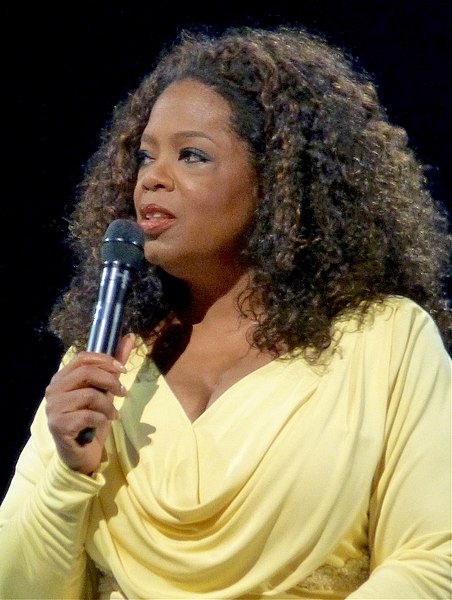Oprah Winfrey

Credit: https://www.flickr.com/photos/aphrodite-in-nyc
Licence: CC-BY-2.0 via Wikimedia Commons
24 October 2014
| Giver: | Individual |
|---|---|
| Receiver: | Individual or unstructured/informal group |
| Gift: | Money, Voice/Advocacy |
| Approach: | Philanthropy |
| Issues: | 4. Quality Education |
| Included in: | Kindness and Generosity, Private Foundations |
Oprah Winfrey is an American icon, media mogul and philanthropist who believes in using her platform as “a force for good.” As host of the phenomenally successful daytime talk show “The Oprah Winfrey Show”_ _for 25 years, Winfrey earned the love of a global audience and became the first Black woman billionaire. Since ending the show in 2011, she has presided over OWN: The Oprah Winfrey Network, a multi-platform digital media outlet for entertaining, informative, and inspirational content.
An engaged philanthropist throughout her career, Winfrey has donated more than USD 400 million to educational initiatives that expand opportunities in underserved communities. Any consideration of Winfrey’s philanthropic impact must also acknowledge the catalytic power of the “Oprah Effect,” with which she mobilizes her vast network of fans and followers to perform acts of kindness and generosity in their own lives.
Born in rural Mississippi in 1952, Winfrey overcame extreme material poverty and childhood trauma to earn a full scholarship to attend Tennessee State University, a historically Black institution. A gifted communicator with a penchant for emotional candor, she discovered her talent as a talk show host after being told she lacked the objectivity for broadcast news. The Oprah Winfrey Show launched locally in Chicago in 1985, was nationally syndicated the following year and soon became the highest-rated talk show on television.
Trusted and admired by millions of daily viewers, Winfrey exerted enormous cultural influence, with an ability to shape consumer trends, public opinion and personal life choices that became known as “The Oprah Effect.” Beyond her favorite books, businesses and gadgets, one of the less tangible things Winfrey consistently promoted over the years was the transformative power of generosity.
In 1997 Winfrey rallied viewers to donate their spare change for college scholarships given by the Boys & Girls Clubs of America and to volunteer their time to build homes with Habitat for Humanity. Based on the success of these campaigns, in 1998 she launched Oprah’s Angel Network, a nonprofit organization that received viewer donations and distributed grants to change-making community programs. Over the course of its 12-year history, the Angel Network raised more than $80 million from 150,000 donors.
The Angel Network ceased operations in conjunction with the end of “The Oprah Winfrey Show.” In 2011 Winfred launched the Oprah Winfrey Charitable Foundation as the locus of her philanthropic activity.
Since 1989 Winfrey has donated more than USD 25 million of her own funds to the Oprah Winfrey Scholars Program, which provides financial aid and offers leadership development to awarded students at Morehouse College, a historically Black men’s college in Atlanta. Another personally funded initiative is the Oprah Winfrey Leadership Academy for Girls in Johannesburg, South Africa, established in 2007 with an initial investment of USD 40 million to serve academically promising girls from disadvantaged backgrounds.
A 2013 recipient of the Presidential Medal of Freedom, the nation’s highest civilian honor, Winfrey continues to embody and encourage the spirit of generosity and kindness in all of her public endeavors.
Contributors: Maha Tazi, Erin Brown
| Source type | Full citation | Link (DOI or URL) |
|---|---|---|
| Website |
Jackson, David. “Obama awards Medal of Freedom to Clinton, Oprah, others”. USA Today, 2012 |
- |
| Website |
McLaren, Elsa. “Oprah Winfrey opens school for poor South African girls”. The Times, 2007 |
- |
| Website |
Mirabella, Linda. “Cash Donations, Benefit Concerts, Celebrity Auctions and Celebrity Volunteers to Benefit Victims of Hurricanes Katrina and Rita”. LAStarz, 2008. |
- |
| Publication |
O’Connor, Clare. “The Education Of Oprah Winfrey: How She Saved Her South African School”. Forbes, 2012 |
- |
| Publication |
Quintanilla, Carlos. “The Oprah Effect”. CNBC, 2011 |
- |